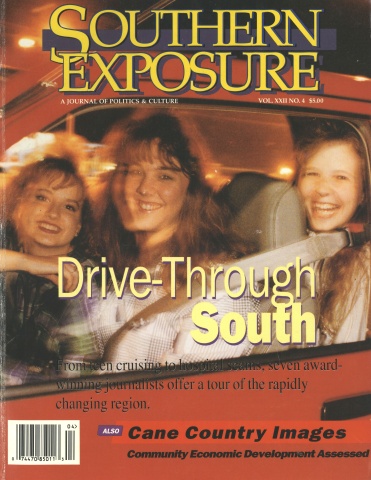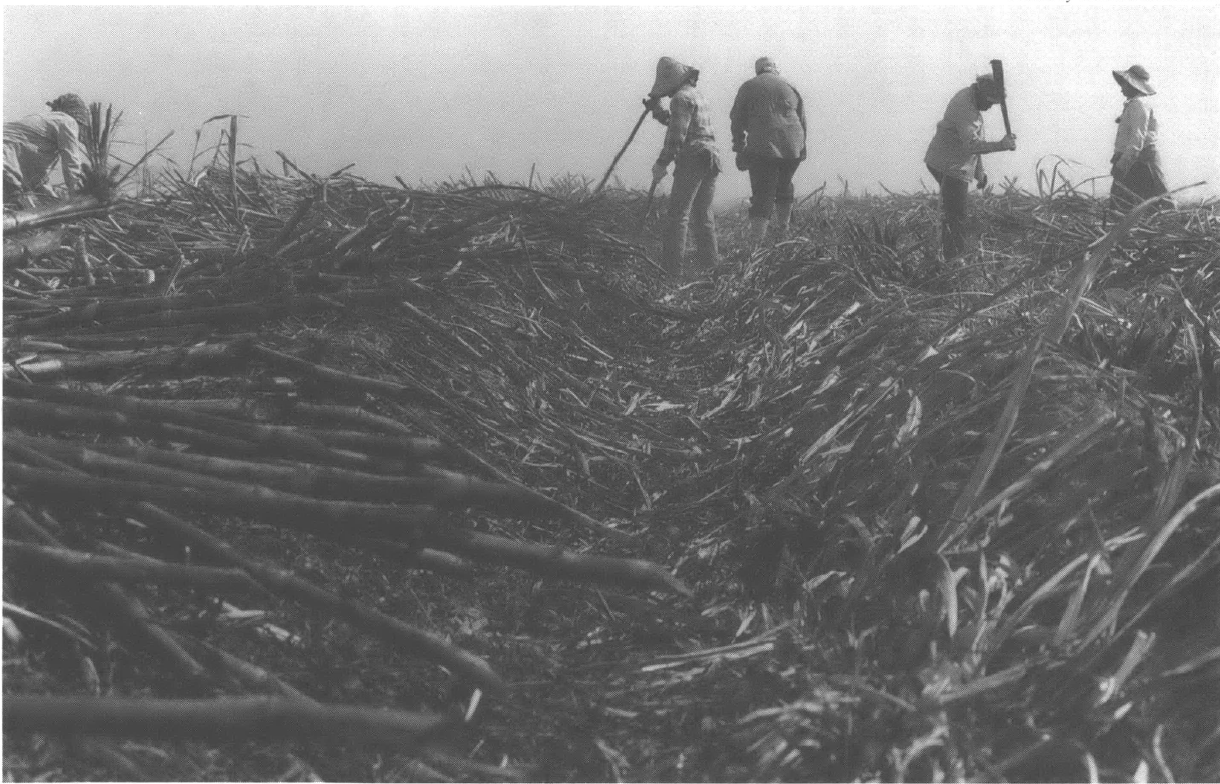
This article originally appeared in Southern Exposure Vol. 22 No. 4, "Drive-Through South." Find more from that issue here.
My friend, Chandra McCormick, and I rode into Louisiana cane country looking for the people in her photographs. Chandra, a documentary photographer, had shown me pictures of sugarcane workers she had taken over the past 10 years. These were friends she had come to know during trips to cane country, and I too wanted to meet these people who projected quiet images of dignity and elegance in the photographs.
River Road follows the Mississippi River northwestward into St. James, Ascension, St. John the Baptist, and St. Charles parishes. We rode past cane plantations and through the deserted quarters that once housed cane workers. Row houses with long-faded paint, or no paint at all, sit vacant now; the alleys between them which once teemed with children at play are hushed and still.
At Port Allen in West Baton Rouge Parish, we turned off toward Allendale plantation. The lone “matriarch” of the quarters at Allendale, Juanita Matthews, with one of her grandchildren on her hip, told us that Ringo and Rose were dead. They had been the couple with whom Chandra stayed on her visits. The old harmonica-playing man and his son who lived two doors away were also dead, she said. All the others had moved on, too. Some moved to nearby small communities; some to housing projects and subsidized housing. Some went to the cities. She told us 11 of her own 12 children are “grown and gone.”
Our visit coincided with the first cutting of the cane and the beginning of “grinding time” when the cane is trucked to the refineries for processing. Juanita Matthews’ husband runs tractors and machines. Often he will not get home until late night after dropping off workers in nearby parishes. The shucks burned from the cane before it is trucked away leave a sweet smoky pungency that blends with river smells to create wafts of damp, thick air. The same air undoubtedly holds unregulated airborne chemicals from nearby chemical processing plants in this area also known as “Cancer Alley.” Grinding time used to be high time in the quarters. People were working, and they knew they had a payday coming. They would have money to provide for their families and money to celebrate. They would cut cane from sunup to sundown. Then the parties of blues playing and singing would go from house to house for days.
Rose and Ringo had been “scrappers.” Scrappers went to the fields after the machines, scrapped the cane left behind, and packed it into waiting trucks. Chandra remembers that a few years ago, scrappers lived — sometimes several generations to a house — in the dozen or so row houses the workers rented on the Allendale plantation. Even after the advent of two-row machines and as late as 1992, scrappers worked the cane fields. Today, three-row cutting machines brought in by the corporate farmers gather nearly all the cane they can use. These “Big Farmers,” as the local workers call them, see the expense of scrappers as superfluous.
“Nobody scraps anymore,” Juanita Matthews told us, “the machines do it all.” Matthews started working in the cane fields when she was 14. Now, at 58, having been diagnosed with hypertension, she stays at home and keeps her grandchildren.
When I asked Matthews if she had ever thought of leaving, she said, “I lived in Baton Rouge for a couple of years, but I didn’t like it. I like it better here in the country where I feel freer, more secure. My [grand]children can go outdoors, and I don’t have to worry about what they will see when they open the door. I just like it better.”
Padded Steps/Sister Song (a litany)
Walk softly, my sister
You are beauty, myth, legend and extinction
yours is the road too steep to lose foot on lest it sink you into eternal depths
Walk softly,
You a gazelle
picking cane and cotton
remade daily in your ancestors’ images
Walk softly,
Maybe light steps
will leave less of a scent
to be tracked
but history will insist
that you be hunted down in the bush
of your invented realities
those dreams you shared
and made real so that others
would have a path upon which to
Walk softly, my sister
Up in the middle of the night
rocking yours
or someone’s baby
soothing someone’s
momentarily lost soul
carrying shadows into
swamp pathed freedom
Walk softly, sister
Raising six children
fruit of the man you just
want to take care of
your instincts nurture growth
Walk softly
Crow reborn from human bones
phoenix rising out of hatred’s ashes
form beyond definition
giver to a taking world
Walk softly, sister
A lifetime is relative
sometimes a hundred years
lived in twenty or
not even thirty
lived in ninety
Walk softly, sister
The drummer who
plays without sticks
makes you dance while
others hear no music
Walk softly,
Play the piano
like one who reads composers’ spirits
not the music they leave
written on flat pages
Walk softly, sister
Sing your song blue, spiritual
or sassy
New Orleans style
accompanied by holy horns,
sacred strings, divine drums
sing your song, or play it
out on the riverfront
to the water and its many
buried wishes sung daily
by the waves
Walk softly, sister
Human glider fish
one stroke across a pool
water goddess, admired, unadorned, envied and
beyond possession
Softly, my sister
Let the river’s muddy deep waters
heal raw middle passage scars
pried open daily by hopes
snuffed out by years of yearning
Walk softly, sister
Cooking and pouring libation
at foreign altars
while praying your way through tomorrows
torn away from emptinesses
waiting hungrily at locked mind doors
Walk softly, my sister
The stars, the moon, its fullness
every dreary or, blue cloud bright
day is yours
as your magic bounces off mountains
in monotonous minds
Walk softly
In your multi-hued finery
accented by a thousand
dialected tongues that garden scented
ears must hear
Walk softly
And talk to each other
mother to daughter
sister to sister
aunt to niece, one to another
listen and
let the words save you
Walk softly, my sister
Do not be consumed
by your longing
and remember to save
some of you for yourself.
— Quo Vadis Gex-Breaux
Tags
Quo Vadis Gex- Breaux
Quo Vadis Gex- Breaux lives and writes in New Orleans where she also works in development for Dillard University. She has four sons. She has published poems in local and national journals including the Xavier Review, the New Laurel Review, Nkombo, the African-American Review, Black River Journal, and the anthology Word Up.

